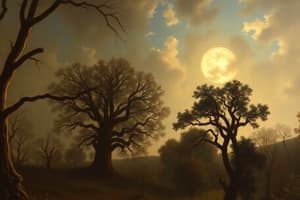Podcast
Questions and Answers
What philosophy does not like variation in a population and considers non-optimal phenotypes as weak individuals?
What philosophy does not like variation in a population and considers non-optimal phenotypes as weak individuals?
Genetic Load
Which philosophy likes non-optimal phenotypes and believes that they might become the new optimum if the environment changes?
Which philosophy likes non-optimal phenotypes and believes that they might become the new optimum if the environment changes?
Pre-adaptation
What is true about Sexual Selection?
What is true about Sexual Selection?
- Male ornaments, songs, and dances usually develop when females are choosing mates. (correct)
- It can produce male ornaments. (correct)
- It leads to the evolution of female weapons.
- Females always choose mates based on physical appearances.
Match the following concepts related to Variation and Selection:
Match the following concepts related to Variation and Selection:
What are the two processes that provide new variation, according to the content?
What are the two processes that provide new variation, according to the content?
What is the only mechanism by which adaptation occurs?
What is the only mechanism by which adaptation occurs?
Why did the idea of natural selection appear difficult to develop?
Why did the idea of natural selection appear difficult to develop?
Darwin finished the first draft of 'On the Origin of Species' in 1842.
Darwin finished the first draft of 'On the Origin of Species' in 1842.
What is the mechanism of __________?
What is the mechanism of __________?
Match the following types of natural selection with their descriptions:
Match the following types of natural selection with their descriptions:
Flashcards are hidden until you start studying
Study Notes
Natural Selection
- Natural Selection is a mechanism of descent with modification, which is the only way adaptation occurs.
- It was a novel and unique idea by Charles Darwin and Alfred Russel Wallace.
Difficulty in Developing the Idea of Natural Selection
- The commonly-held world view was of fixed species, which made it difficult to understand descent with modification.
- The world view focused on similarity among individuals, not variation.
- The world view was that things happen on purpose, guided by God, which is not compatible with natural selection.
- The world view was that species are perfectly suited to their environment, which is not true.
Bias of Evolution
- Progress is not a bias of evolution.
- Aristotle's Scala Naturae and the Early Christian Great Chain of Being are examples of biases that hindered the development of natural selection.
Mechanism of Natural Selection
- Organisms face a constant struggle to survive and reproduce.
- Individuals within a species vary in their characteristics.
- Some individuals are better able to survive and reproduce because of their characteristics.
- The offspring of these individuals resemble their parents, leading to a larger proportion of the population having the beneficial trait.
Fitness
- Fitness is an individual's impact on future generations.
- An individual's fitness is determined by the number of offspring that survive and reproduce.
- The phrase "survival of the fittest" is not entirely accurate; it should be "reproduction of the fittest".
- Relative fitness is what matters, not absolute fitness.
Evolution of Beak Shape in Galapagos Finches
- A 40-year study on Galapagos finches showed that the Grant's study the medium ground finch, Geospiza fortis.
- The finches experienced a severe drought, which led to a selective pressure on the population.
- The finches with larger beaks and body size were more likely to survive and reproduce.
- The population responded to the selective pressure by adapting to their new environment.
Types of Natural Selection
- Stabilizing selection: Extreme phenotypes are lost over time, and the population narrows around the optimum phenotype.
- Directional selection: The optimum phenotype shifts to a new phenotype due to environmental changes.
- Disruptive selection: Two different optima are selected, which can lead to the formation of a new species.
Philosophies about Variation in a Population
- Genetic load: Variation in a population is considered a burden, and non-optimal phenotypes are seen as weak.
- Pre-adaptation: Variation in a population is considered beneficial, as it allows for adaptation to environmental changes.
Sexual Selection
- Sexual selection acts as a selective agent, producing male ornaments, weapons, and courtship behaviors.
- Male ornaments and songs can advertise good genes, and females may choose mates based on these traits.
Characteristics of Natural Selection
- Natural selection acts on individuals, but its effects are seen in populations.
- Natural selection acts on phenotypes, but evolution causes changes in allele frequencies.
- Natural selection is not forward-looking, and populations show traits that were advantageous to their ancestors.
- New traits can evolve through mutation and genetic recombination.
- Exaptations are traits used in a novel way, and they can evolve through natural selection.
- Natural selection does not lead to perfection, and traits often balance between opposing selective pressures.### Nature of Natural Selection
- Natural selection is a non-random process, as the alleles of those who survive and reproduce more increase in frequency in the next generation.
Characteristics of Natural Selection
- Natural selection is not directed or guided, it just occurs as species change in response to environmental changes.
- Evolution is not progressive, and species do not become "better" or more valuable over time.
- Natural selection acts on individuals, not for the good of the species as a whole.
- Traits can only evolve if they increase the fitness of the genes responsible for them, relative to other genes.
Altruism and Kin Selection
- Altruism can evolve through kin selection, where an individual helps relatives, thereby increasing the chances of their own alleles being passed on.
- Example: Female lions nursing other females' young because they are related, thereby helping their own alleles move into the future.
Examples of Evolutionary Pressures
- Infanticide in lions, where a new pride leader kills the unweaned offspring of the previous male, increasing their own fitness by bringing the females back into sa and allowing them to become pregnant with the new male's offspring.
Important Reminders
- Reading assignment 5 (Evolution textbook sections 2.4 and 8.6) is due on Tuesday noon.
- Homework 4 (Moth tongues, orchids, and Darwin – the predictive power of evolution) is due on Tuesday noon.
- Begin studying for Exam 2, which is scheduled for next Thursday.
Studying That Suits You
Use AI to generate personalized quizzes and flashcards to suit your learning preferences.




